Table of Contents[Hide][Show]
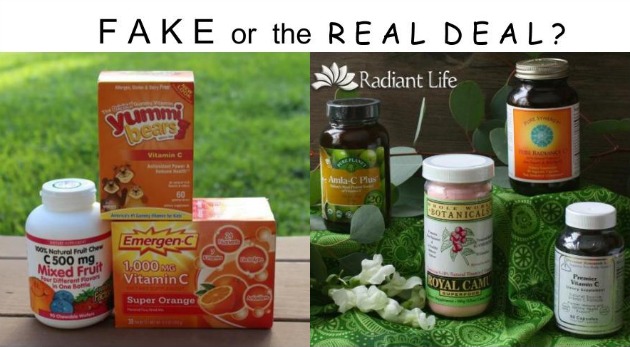
There is little dispute in either conventional or alternative health circles about the critical importance of vitamin C to optimal wellness.
When most people consider the consequences of vitamin C deficiency, however, the usual image that comes to mind is of a scurvy ridden, orally challenged, 16th-century sailor who has run out of limes!
While a severe deficiency of vitamin C is rare anymore, subclinical deficiency is most definitely not.
A powerful anti-oxidant, vitamin C is a water-soluble nutrient that is needed for numerous biological functions including:
- Tissue growth and repair
- Strength of capillary walls
- Lactation
- Preventing adrenal fatigue
- Formation of collagen
- Healing of wounds
Vitamin C is probably best known for its ability to shorten the duration and severity of the common cold as popularized by Dr. Linus Pauling in his 1970 book, Vitamin C and the Common Cold.
Found in many fruits and vegetables and in some animal organs, vitamin C is a delicate nutrient that is destroyed by heat. Consequently, in the modern diet where the majority of most people’s meals consist of highly processed fare, little vitamin C remains for absorption.
The problem of little natural vitamin C in the heavily processed, modern diet is compounded by the fact that the millions of individuals with blood sugar issues such as hypoglycemia require more vitamin C as this condition interferes with its metabolism by the body.
In addition, alcohol consumption and many common drugs such as aspirin and the birth control pill may reduce vitamin C levels in the body.
With vitamin C so critical and yet so elusive in the modern diet with higher than normal levels required by many due to metabolic issues or drug interactions, it is no wonder that vitamin C supplements are absolutely everywhere – commonly sold even at gas stations!
While vitamin C supplementation is a good idea for most people (I take one myself as do my children and husband), supplementation with just any vitamin C is not.
The Truth about Ascorbic Acid
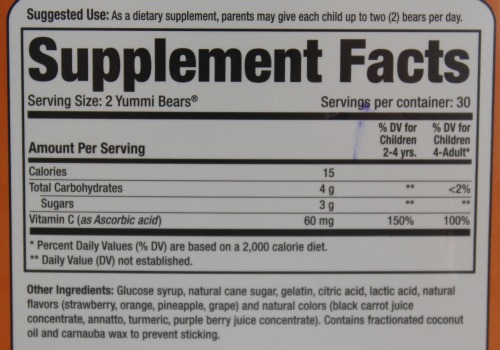 The problem is that most vitamin C is not really vitamin C at all. It is ascorbic acid, a synthetic, lab created version not found anywhere in nature, which is only one part (the outer layer) of the complete vitamin C complex.
The problem is that most vitamin C is not really vitamin C at all. It is ascorbic acid, a synthetic, lab created version not found anywhere in nature, which is only one part (the outer layer) of the complete vitamin C complex.
Consumption of isolated ascorbic acid is not a good idea on a regular basis. Some evidence suggests that large doses may lead to imbalances and deficiencies in the flavonoids (vitamin P), a powerful family of over 6,000 antioxidants that have a symbiotic working relationship with vitamin C – each increasing the other’s effect.
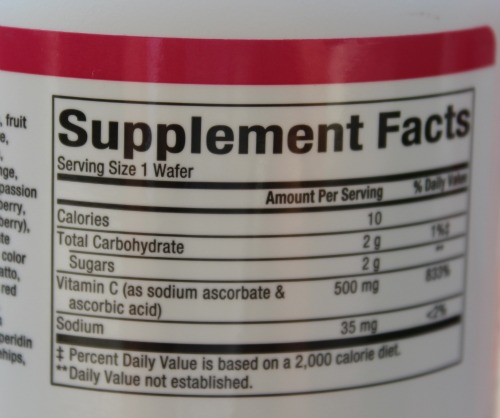 Even more worrisome is that ascorbic acid, while proven to kill bacteria effectively, is not discriminatory in its anti-microbial abilities as it also wipes out good bacteria or probiotics in the gut. Whole foods based vitamin C does not harm beneficial intestinal bacteria in the same way as synthetic vitamin C does.
Even more worrisome is that ascorbic acid, while proven to kill bacteria effectively, is not discriminatory in its anti-microbial abilities as it also wipes out good bacteria or probiotics in the gut. Whole foods based vitamin C does not harm beneficial intestinal bacteria in the same way as synthetic vitamin C does.
Another wake up call about ascorbic acid – it is synthesized from corn syrup. If you take a supplement with ascorbic acid, you guessed it, you are likely consuming a supplement with GMO origins (unless the corn was certified organic) without even knowing it!
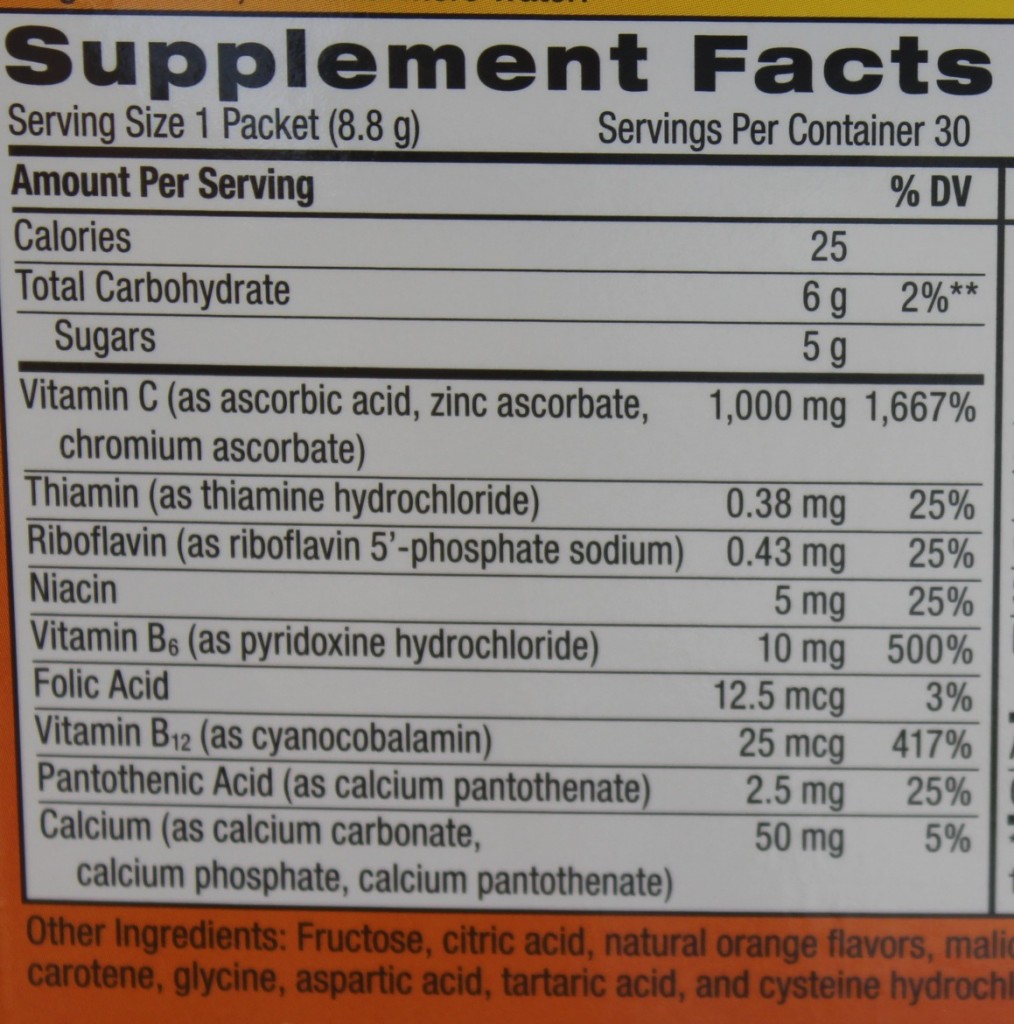 To show you just how common GMO derived, probiotic destroying ascorbic acid masquerading as true vitamin C is, I took photographs of the labels of three extremely popular vitamin C supplements at the healthfood store. The pictures to the right show that there is no real vitamin C to be found in any of them, even the children’s yummi bears!
To show you just how common GMO derived, probiotic destroying ascorbic acid masquerading as true vitamin C is, I took photographs of the labels of three extremely popular vitamin C supplements at the healthfood store. The pictures to the right show that there is no real vitamin C to be found in any of them, even the children’s yummi bears!
True Vitamin C with No Additives
Given that natural vitamin C is destroyed by heat and that the vast majority of “vitamin C” supplements and foods fortified with “vitamin C” don’t contain any true vitamin C at all, what is a person who needs to supplement with this critical nutrient to do?
Finding a quality vitamin C supplement is indeed hard! In fact, I didn’t take one for years simply because I couldn’t find one that was 100% whole foods based with no additives whatsoever. Every single time I tried one that was “almost” good enough, I would end up stopping it as it would inevitably give me bad headaches.
It is only in the past few months that I have finally started to take a vitamin C supplement regularly because at last I found a line that is low heat processed, whole foods based, and entirely additive free. The funny thing is, the products were right under my nose all along and I didn’t even realize it!
My friends Norm and Kathy LeMoine of Radiant Life offer a quality line of whole food vitamin C supplements to choose from. The one I’ve been taking and very much enjoying is Pure Radiance C. You simply stir a 1/4-1/2 teaspoon in a some filtered water and drink. It tastes great!
You can also hold the vitamin C mixture in your mouth for a minute or so before swallowing to allow vitamin C to absorb directly into the thin and delicate gum tissue. Great for those with periodontal problems.
Capsules are also available if desired for added convenience.
Radiant Life offers several other whole foods vitamin C products with no additives to choose from as well. The difference between the products is the whole food sources of the vitamin C. Choose whichever mix of vitamin C sources suits your nutritional goals best. The chart below illustrates the various product options.
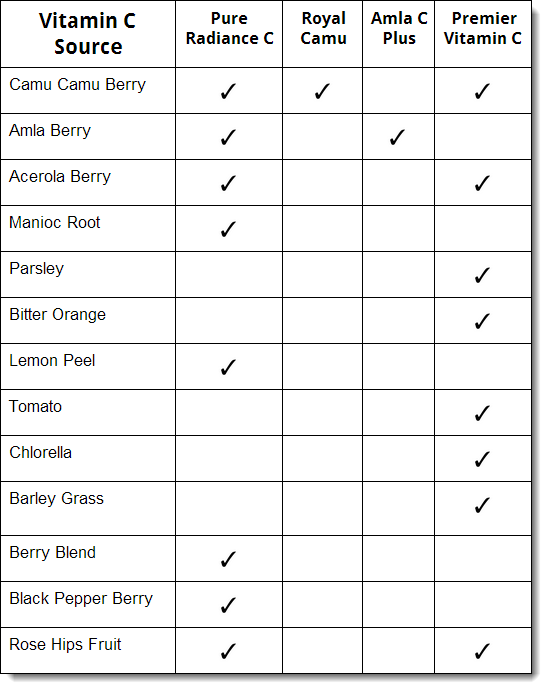
If this article has caused you to throw up your hands in dismay because the vitamin C you had chosen for your family turned out to be synthetic and probably of GMO origins, don’t despair!
Move forward with the newfound knowledge that vitamin C from a whole foods supplement with zero additives is in fact available and that there is a company you can trust which offers four superior forms of this important nutrient for you to choose from. Click here to review your real Vitamin C options and ditch those GMO wannabe’s.
References
(1) Vitamin Primer
(2) Synthetic Vit C kills beneficial bacteria in the gut
(3) What’s Wrong with Synthetic Vit C








Can you please tell me if this Vit C product is sold in stores, like in all states in the USA ? Some states have hot weather for most of the year. I would not want to mail order delicate vitamins thought would be ruined in the heat.
Thank you.
Hi Sarah, I love this article. I’m working with a client right now who likes her Emergen-C for the other good stuff in it (potassium, calcium, magnesium, B12). Do you know of a healthier (organic, non-GMO) vitamin C replacement that has those extra vitamins & phytonutrients?
Yes … linked to in the article Jennifer 🙂
Glad to know the real vitamin c exist.
Im in the UK and the shipping on these are too high. I am on a very low income, below the breadline and the shipping is just too high on top of the pills. Do you know of some similar in the UK? I have searched but not getting anywhere. Thanks
Ps did you know, this is a white background with very very light grey font? I can hardly see what Im writing. Maybe you could change this to a black font?
Hello:
Vitamin C by definition, is ascorbic acid. Its chemical composition is completely described in chemistry manuals. That is pure vitamin C. If you also put in rose hips, even if rose hips is present, naturally, from where you extract vitamin C, it is still vitamin C with rose hips, not pure vitamin C.And if all you want to buy is vitamin C, from the list you have provided, none of them is vitamin C. Put another way if I want to buy vitamin C, from the list you provided, you would not know which product I should buy because, it is always vitamin C with something else; not what I want. And, if I want to buy rose hips, for example, I would go and buy rose hips. Except I guess you would know be abvle to find someone who is looking out to buy rose hips.
I read a book by Matthias Rath, a follower of your cited Linus Pauling when I had a five-bypass CABG 20 years ago, and just by following the vitamin C recommendations I have had no need for any “intervention” (cardiologists lingo). I have no objections against vitamin C mixed with anything, but I think the industry is gradually making it difficult for me to buy pure ascorbic acid. And that is a crying shame.
Kaypohchee
So if this Radiant Life Vit C contains buckwheat berry sprouts, is it then not grain free?
buckwheat is not a grain.
Hi…what vitamin c tablets do you give your children? So hard to find one that doesn’t have ascorbic acid.
I use the vitamin C powder linked to in the post.
I found Suzanne Humphries’ lecture about vitamine C very helpful: youtube.com/watch?v=y0LLX0sgwAU
She says it is not necessary to take natural sources (in case of bad illness) simply because the dosis are too low.
Jeez, just the mention of corn and ascorbic acid should deem Vitamin C from that source non-viable. Any supplement I try out, and find it has fillers, they’re fired, the other thing I look for is organic and tested for heavy metals, you don’t find that certification hardly anywhere, metal is apparently in everything! Air, food, water. Mercury free?, is their such a thing? Start looking at your supplement powders, or nuts & seeds, foods under a stereoscope or microscope, might be surprised what you find.
Don’t know about GMO free corn, or anything anymore, for some blood types like O, just best to not eat corn or wheat period. If I did not have such cravings for bread, corn, and anything sweet I wouldn’t know any better. This article is a perfect example, where I see no agreement I can dig further, see that buying Vitamin C ascorbic acid tablets are so cheap, makes me wonder if the efficacy is anything at all, cheap means cheaply made from something that else that is cheaply made, usually for some reason like an easier process, which means automation..
My Vitamin C of choice right now is ascerola freeze dried, certified organic and tested for heavy metals.
How many mg do you take? I recently started looking for more natural ways to cure illness and really looked into vitamin c. I’ve been taking buffered c complex from vitacost, I assume the ascorbic acid they use is probably synthetic but I took 8000-10000 mg thoughout the day when I had a fever and chills and the next day I felt great! So I don’t know if it was because it had more of the complex than regular synthetic ascorbic acid or not.
Thanks C, for the heads-up about ascerola. I had never heard of this product before. I wonder if the powder is as good as freeze-dried?
Seems u fudged ur research http://en.m.wikipedia.org/wiki/Ascorbic_acid ascorbic acid is naturally soruced unless its d ascorbic acid which is synthetic and doesnt occur in nature
wikipedia is your source?